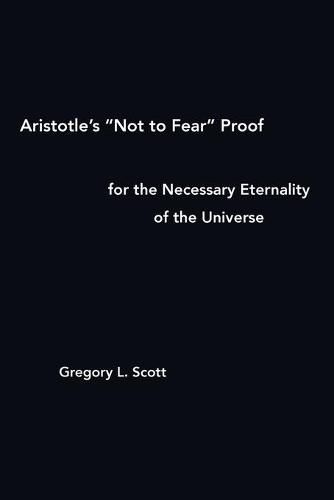Readings Newsletter
Become a Readings Member to make your shopping experience even easier.
Sign in or sign up for free!
You’re not far away from qualifying for FREE standard shipping within Australia
You’ve qualified for FREE standard shipping within Australia
The cart is loading…






This title is printed to order. This book may have been self-published. If so, we cannot guarantee the quality of the content. In the main most books will have gone through the editing process however some may not. We therefore suggest that you be aware of this before ordering this book. If in doubt check either the author or publisher’s details as we are unable to accept any returns unless they are faulty. Please contact us if you have any questions.
Aristotle’s Unmoved Mover of Metaphysics Lambda, often called God, still convinces some non-believers to become theists, despite its paradoxical nature. One recent case is the British philosopher, Antony Flew, co-author of There is a God: How the World’s Most Notorious Atheist Changed His Mind (2007). As Pure Actuality, the Mover has no potentiality, matter or physicality of any sort whatsoever and exists forever, with no potential therefore of not existing. It somehow guarantees the existence of the universe that could disappear but, because of the Mover, does not. Moreover, It thinks of itself thinking, always, like a hyper-intellectual Narcissus.
With derision, Cicero rejected the doctrine; Franz Brentano (1838-1917), a teacher of Sigmund Freud and Edmund Husserl, called it prattle without all sense and reason ; and Werner Jaeger (1888-1961), a renowned specialist of Aristotle, demonstrated that the Northern Greek from Stagira evolved as he matured, helping explain discrepancies in various manuscripts. However, none of these thinkers provided for Aristotle the reasons the universe would not vanish without an Unmoved Mover. Scott does.
All specialists know that the Stagirite accepted the infinite past. This book demonstrates that he also held the Principle of Plenitude- for infinite things, what may be, is (Physics III 4). Since every possibility has already been fulfilled in past time and since the infinitely-existing universe still persists, Aristotle concludes in Metaphysics Theta 8 that there is no fear that the heavens will ever stop moving. For additional reasons based on a profound understanding of necessity and possibility, he holds that this eternal motion is necessary, without any recourse to the Mover.
Necessary eternal motion therefore supplants Aristotle’s youthful doctrine of Pure Actuality, all of which solves another perennial problem in ancient Greek philosophy. The later Peripatetics, including Theophrastus, never embraced Pure Actuality and indeed, like the other later schools of philosophy, subsequently never even cared to discuss what is for later metaphysicians such an important doctrine. Scott’s interpretation finally explains this, because the youthful, discarded doctrine was only revived 500 years later, with the commentary of Alexander of Aphrodisias, who does not recognize Aristotle’s truly mature view and who thereby muddies the theological waters to this day.
$9.00 standard shipping within Australia
FREE standard shipping within Australia for orders over $100.00
Express & International shipping calculated at checkout
This title is printed to order. This book may have been self-published. If so, we cannot guarantee the quality of the content. In the main most books will have gone through the editing process however some may not. We therefore suggest that you be aware of this before ordering this book. If in doubt check either the author or publisher’s details as we are unable to accept any returns unless they are faulty. Please contact us if you have any questions.
Aristotle’s Unmoved Mover of Metaphysics Lambda, often called God, still convinces some non-believers to become theists, despite its paradoxical nature. One recent case is the British philosopher, Antony Flew, co-author of There is a God: How the World’s Most Notorious Atheist Changed His Mind (2007). As Pure Actuality, the Mover has no potentiality, matter or physicality of any sort whatsoever and exists forever, with no potential therefore of not existing. It somehow guarantees the existence of the universe that could disappear but, because of the Mover, does not. Moreover, It thinks of itself thinking, always, like a hyper-intellectual Narcissus.
With derision, Cicero rejected the doctrine; Franz Brentano (1838-1917), a teacher of Sigmund Freud and Edmund Husserl, called it prattle without all sense and reason ; and Werner Jaeger (1888-1961), a renowned specialist of Aristotle, demonstrated that the Northern Greek from Stagira evolved as he matured, helping explain discrepancies in various manuscripts. However, none of these thinkers provided for Aristotle the reasons the universe would not vanish without an Unmoved Mover. Scott does.
All specialists know that the Stagirite accepted the infinite past. This book demonstrates that he also held the Principle of Plenitude- for infinite things, what may be, is (Physics III 4). Since every possibility has already been fulfilled in past time and since the infinitely-existing universe still persists, Aristotle concludes in Metaphysics Theta 8 that there is no fear that the heavens will ever stop moving. For additional reasons based on a profound understanding of necessity and possibility, he holds that this eternal motion is necessary, without any recourse to the Mover.
Necessary eternal motion therefore supplants Aristotle’s youthful doctrine of Pure Actuality, all of which solves another perennial problem in ancient Greek philosophy. The later Peripatetics, including Theophrastus, never embraced Pure Actuality and indeed, like the other later schools of philosophy, subsequently never even cared to discuss what is for later metaphysicians such an important doctrine. Scott’s interpretation finally explains this, because the youthful, discarded doctrine was only revived 500 years later, with the commentary of Alexander of Aphrodisias, who does not recognize Aristotle’s truly mature view and who thereby muddies the theological waters to this day.